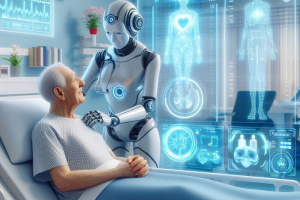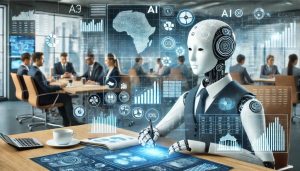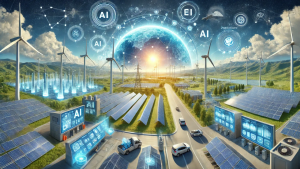Real-World Applications of AI: How It Will Impact Industries in 2026
Introduction Artificial Intelligence (AI) is steadily moving from innovation labs into everyday business operations. By 2026, it will be deeply integrated into many sectors, d...

Introduction
Artificial Intelligence (AI) is steadily moving from innovation labs into everyday business operations. By 2026, it will be deeply integrated into many sectors, driving smarter decisions, improving efficiency, and creating new opportunities for growth. Let’s look at real-world applications of AI at how AI will reshape key industries in the near future – and what it means for businesses and consumers alike.
Healthcare: Smarter Diagnostics and Personalized Care
In healthcare, artificial intelligence is already proving its value, and by 2026, it will become indispensable. Advanced algorithms will analyze medical images, identify patterns, and detect conditions like cancer or cardiovascular disease earlier than ever before.
AI-powered platforms will also support personalized medicine, developing treatment plans based on each patient’s genetic profile and their response to medications. Predictive analytics will help hospitals anticipate patient needs, more effectively allocate resources, and prevent readmissions.
Meanwhile, AI-powered chatbots will handle patient inquiries, schedule appointments, and even remind users to take their medications, increasing accessibility and reducing administrative burden.

Manufacturing: From Automation to Intelligent Optimization
AI is transforming manufacturing, going beyond traditional automation. By 2026, predictive maintenance will become standard practice: sensors and AI models will monitor equipment performance in real time, identifying problems before they break down.
AI will also help optimize production and supply chain planning. By analyzing historical data, weather conditions, and global logistics, it will be able to more accurately forecast demand. This leads to reduced waste, shorter delivery times, and improved cost control.
Robotics will also evolve: AI-powered robots will be able to adapt to various tasks, work safely alongside humans, and learn from their own experience.
Retail: Predictive Shopping and Immersive Experiences
Personalization in retail will reach a new level. By 2026, artificial intelligence systems will predict shoppers’ needs even before they begin searching. Machine learning will analyze data on online behavior, purchases, and even social media to create hyper-personalized recommendations.
AI-powered chatbots will take on a significant role in customer support, providing instant and natural responses. Meanwhile, virtual fitting rooms and augmented reality tools will help shoppers visualize products in real time, bridging the gap between online and in-store shopping.
For retailers, artificial intelligence will improve inventory management by automatically replenishing popular items and minimizing waste from overproduction.
Finance: Safer, Faster, and Smarter Operations
The financial industry will continue to benefit from the precision of AI. Fraud detection algorithms will analyze transactions in real time, identifying irregularities that may indicate fraud or a data breach.
AI will also be used in robo-advisors, providing clients with personalized investment recommendations based on their spending habits, risk appetite, and market trends. In banking, AI-powered automation will perform repetitive tasks such as credit assessments and document verification, reducing errors and increasing efficiency.
Furthermore, generative AI tools will help analysts interpret complex data sets and identify patterns that humans might miss, enabling institutions to make more informed strategic decisions.

Transportation: Smarter Routes and Safer Roads
AI is driving the transportation industry toward greater efficiency and safety. By 2026, driverless vehicles will become more common on public roads thanks to advances in computer vision and decision-making algorithms.
AI will also manage intelligent traffic systems, reducing congestion and optimizing travel times. In logistics, route optimization tools will reduce fuel consumption and emissions, while drones and driverless delivery vehicles will make last-mile logistics faster and more environmentally friendly.
These advances will make mobility more convenient and eco-friendly for both consumers and businesses.
Education: Adaptive Learning for Every Student
AI is changing the way we teach. Adaptive learning platforms will use data to personalize lessons based on each student’s strengths and weaknesses. Instead of a one-size-fits-all approach, teachers will receive AI-powered insights that help each student develop individually.
Translation, speech recognition, and accessibility tools will make education more inclusive for students with different abilities and language backgrounds. AI-powered virtual tutors will provide 24/7 support, helping students master complex topics at their own pace.
In 2026, AI won’t replace teachers – it will become their trusted partner, making learning more effective and engaging.
Energy and Sustainability: Intelligent Efficiency
AI will play a crucial role in combating climate change. Smart grids will use AI to balance supply and demand in real time, more efficiently integrating renewable energy sources such as wind and solar.
Predictive maintenance will reduce downtime in renewable energy infrastructure, and AI-powered analytics will help companies identify areas where energy consumption can be optimized. In manufacturing and logistics, AI will track carbon footprints and suggest greener alternatives.
By transforming raw data into practical solutions, AI will help industries move closer to sustainability goals while maintaining profitability.

Conclusion
By 2026, AI will not only automate processes but also complement human intelligence. Companies that implement it wisely will gain a competitive advantage through deeper data analysis, increased efficiency, and improved customer service.
However, this rapid development also brings responsibility. Companies must ensure transparency, ethical use of data, and accountability when making AI-powered decisions.
The future of AI is not about replacing humans, but about enabling them to work smarter, faster, and more creatively. Those who find this balance will become the industry leaders of tomorrow.